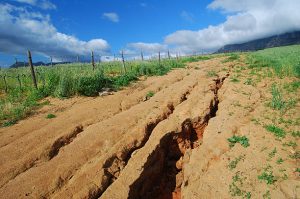
Effective home maintenance is critical in safeguarding one’s investment, and gutters are often at the forefront of this task.
While they may appear to be a minor property component, the consequences of neglecting them can be significant.
Beyond the apparent issues of water damage to the structure, clogged gutters can have a profound environmental impact.
This article aims to shed light on how blocked gutters affect not just your home, but also the broader ecosystem and community.
1. Water Overflow and Soil Erosion

When gutters become clogged with debris, whether it’s leaves, twigs, or other materials, they can no longer effectively channel rainwater away from the property. This leads to water overflow, which cascades down the sides of the building, accumulating around the foundation. Over time, this constant water exposure can erode the soil surrounding the property. Erosion then becomes a significant environmental concern, as it affects not only the structural integrity of the building but also the stability of the surrounding land.
Soil erosion can lead to numerous environmental problems. It reduces the fertile topsoil, which is crucial for plant growth. Once the topsoil is lost, the land becomes less productive and more susceptible to further erosion and degradation. This impacts your garden and the local flora and fauna that depend on a stable environment.
2. Contaminated Waterways
A less obvious but equally critical issue arising from blocked gutters is the contamination of local waterways. As water overflows from clogged gutters, it often carries the debris it has picked up. This runoff typically flows into the nearest storm drain, which connects to rivers, lakes, and other bodies of water. The debris can contain harmful substances, including chemicals from roofing materials, bird excrement, and other pollutants, which can degrade water quality.
Contaminated waterways have far-reaching effects on both human and wildlife health. For instance, pollutants can affect drinking water sources, making them unsafe for consumption. Aquatic life is also at risk, as many species are sensitive to changes in water quality. Contaminated water can lead to decreased populations of fish, amphibians, and other water-dependent organisms, disrupting the balance of local ecosystems.
3. Habitat Destruction

The overflow of water from blocked gutters doesn’t only affect the immediate vicinity of your property. The increased water run-off can lead to flooding in surrounding areas, which can destroy natural habitats. Once dry areas may become waterlogged, leading to changes in vegetation and loss of habitat for various species. For instance, waterfowl might lose nesting grounds, and small mammals could be driven from their homes.
Flooding resulting from clogged gutters can also influence urban green spaces, leading to the loss of trees and shrubbery. These plants provide essential services, such as oxygen production, carbon sequestration, and temperature regulation, which benefit both humans and wildlife. As these plants die off, the immediate urban environment becomes less hospitable, and local biodiversity diminishes.
4. Increased Risk of Pest Infestations
Stagnant water resulting from clogged gutters creates a breeding ground for pests, especially mosquitoes. These insects are not just a nuisance; they are vectors for diseases such as West Nile virus and encephalitis. In addition to mosquitoes, stagnant water can attract other pests, including rodents and birds, which can carry their own sets of diseases and potentially infest homes.
As local pest populations grow, they can spread to the surrounding community, impacting public health. Increased use of pesticides to control these pests can further harm the environment, contaminating soil and waterways, and affecting non-target species, including beneficial insects like bees and butterflies.
5. Climate Change Impact
While it might seem far-fetched, mismanaged water flow from blocked gutters can contribute to climate change. When water fails to flow correctly through gutters and piping, it often finds its way to impermeable surfaces, such as driveways and roads, rather than being absorbed into the ground. This change in water flow patterns can exacerbate local flooding incidents, which are becoming increasingly frequent due to climate change.
Flooding releases greenhouse gases from disturbed soils and waterlogged areas. Moreover, the increased frequency and severity of urban flooding can contribute to infrastructure damage, requiring energy-intensive repairs and increasing overall carbon footprints. Proper gutter management can mitigate some of these localized climate impacts by ensuring water is directed where it can be naturally absorbed, supporting groundwater recharge, water conservation, and maintaining local hydrology.
6. Structural Damage and Resource Use
The structural damage to homes caused by clogged gutters can also have an environmental impact. Water damage can weaken walls and foundations, leading to the need for significant repairs. These repairs often involve the use of new materials and energy-intensive construction processes. The production and transportation of construction materials contribute to greenhouse gas emissions and resource depletion.
Additionally, neglected gutter systems can eventually lead to the replacement of roofing and siding materials prematurely. Manufacturing these materials is resource and energy-intensive, contributing to higher carbon footprints. By maintaining gutters, homeowners can prolong the life of their home materials, reducing the need for repairs and replacements for pieces of furniture and thereby conserving resources.
7. The Role of Professional Gutter Services
Given the various environmental impacts of clogged gutters, regular maintenance is crucial. While some homeowners choose to clean their gutters themselves, hiring a professional gutter maintenance company can provide more reliable results. Professional services not only ensure that gutters are thoroughly cleaned but can also inspect for any potential issues that might lead to future blockages.
Professional companies have the tools and experience to perform the job safely and efficiently. They can also offer advice on gutter guards and other preventative measures to keep gutters free-flowing year-round. By employing professional services, homeowners can reduce the risks of water damage and associated environmental effects, ensuring that their property and local environment remain protected.
Conclusion
Clogged gutters pose a significant threat to both homes and the environment. From causing soil erosion and contaminating waterways to increasing pest populations and even contributing to climate change, the effects are far-reaching. Maintaining clean and functional gutters is not just about home preservation; it’s also about being a responsible environmental steward. Hiring a professional gutter maintenance company can provide peace of mind, knowing that your home is protected, and you are contributing positively to environmental sustainability. Proper gutter care can have a lasting impact on the health and well-being of our communities and the natural world.
![]()
Author Profile
- Passionate content creator, contributor, freelance writer and content marketing allrounder.
Latest entries
 Green LivingDecember 18, 2025Self-Service Hydration: Should You Choose Mains-Fed or Bottled Water?
Green LivingDecember 18, 2025Self-Service Hydration: Should You Choose Mains-Fed or Bottled Water? DictionaryDecember 16, 2025UK Eco Christmas Gifting Trends 2025: Expensive Presents or Sustainable Experiences?
DictionaryDecember 16, 2025UK Eco Christmas Gifting Trends 2025: Expensive Presents or Sustainable Experiences? Green Home GuidesDecember 10, 2025How Windows and Doors Can Cut Your Energy Bills and Help the Planet
Green Home GuidesDecember 10, 2025How Windows and Doors Can Cut Your Energy Bills and Help the Planet EnvironmentNovember 18, 2025What Are Ecological Surveys? Definition, Purpose, and Process
EnvironmentNovember 18, 2025What Are Ecological Surveys? Definition, Purpose, and Process






Leave a Reply
You must be logged in to post a comment.